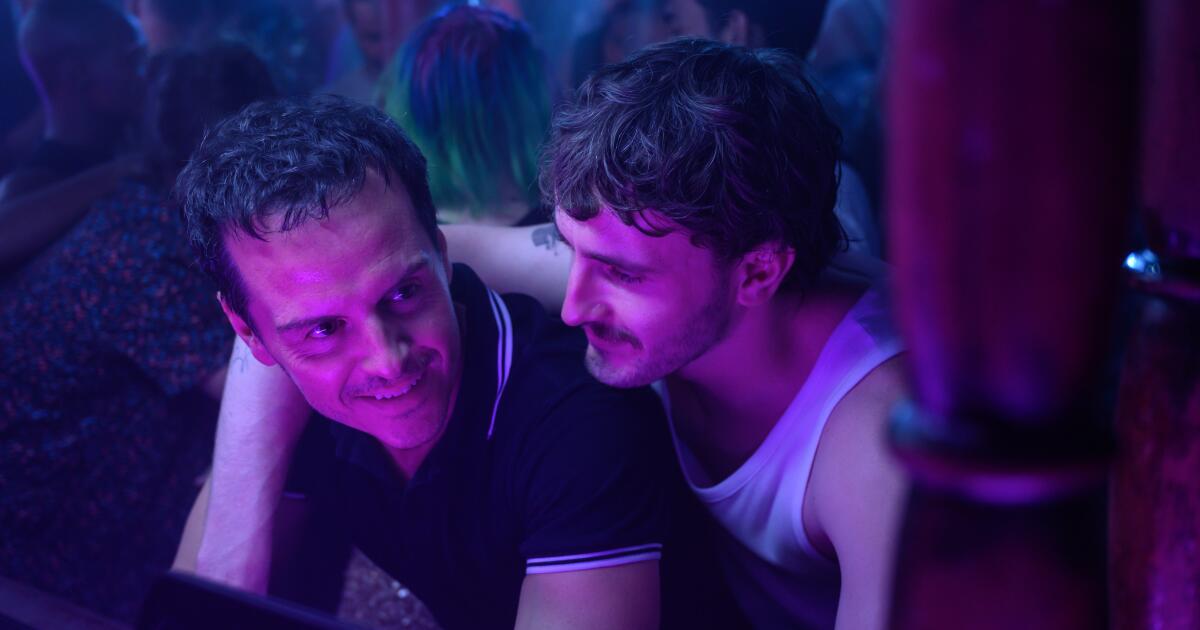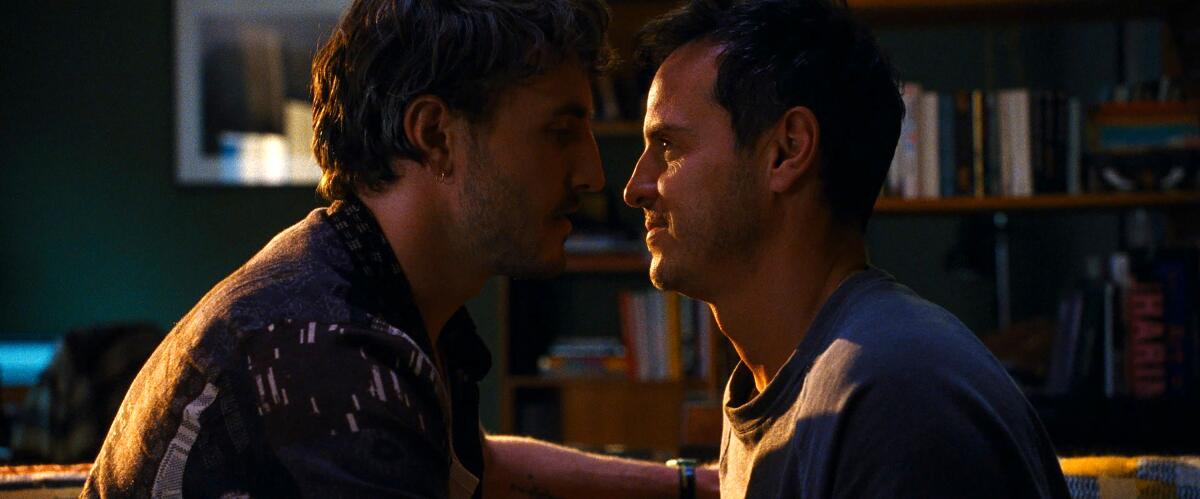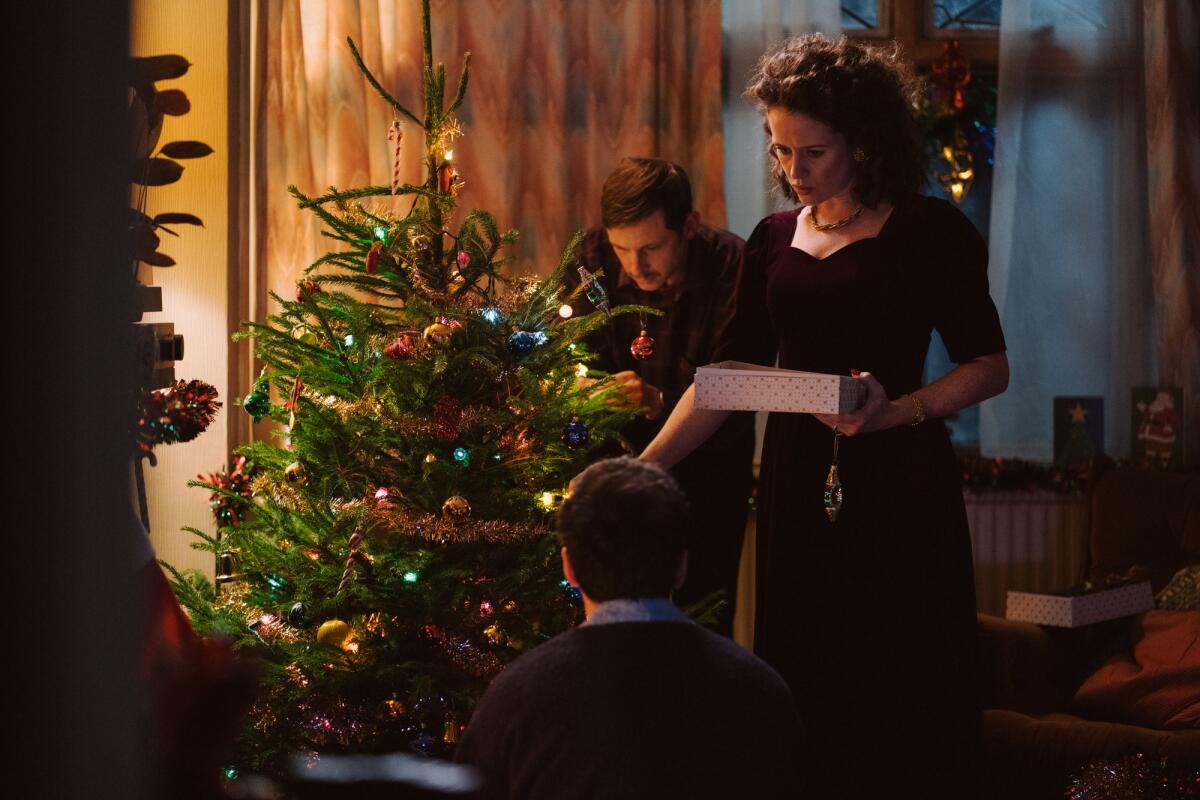
More than any great movie I can remember, Andrew Haigh’s “All of Us Strangers” captures the eerie, disorienting and utterly sacred experience of encountering a lost loved one in your dreams. There they are, smiling at you as if it were the most natural thing in the world, as if they haven’t actually been gone a decade or more. You may smile back and even give them a hug, in hopes that your physical touch might cement the moment and confirm that everything is happening for real. But by that point, the reunion has already taken on a peculiar sadness, a tinge of unreality that only a cruel shock of daylight and the tears on your pillow will be able to explain.
The achievement of this quietly devastating movie, loosely and exquisitely adapted from Taichi Yamada’s 1987 novel “Strangers,” is to sustain and explore these feelings with a freedom that movies are rarely able to promise. For Adam (a pitch-perfect Andrew Scott), a wistful screenwriter in his 40s, the journey begins not long after he’s moved into a conspicuously underpopulated London high-rise. Seeking creative inspiration, and perhaps a little refuge from his own loneliness, he hops on a train to his nearby hometown of Sanderstead and drops in on his parents, whom he hasn’t seen in some time. He and his father (Jamie Bell) greet each other outside a liquor store, then head back to the house where Adam’s mother (Claire Foy) is waiting for them: “Yes, it is you,” she says to her son before waving him inside.
Yet something seems immediately though not disturbingly amiss, given his parents’ matter-of-fact demeanor — they seem to have been expecting him — and strikingly youthful appearance. (Foy and Bell are both younger than Scott, though the last’s own boyish affect confuses the issue further.) His mum and dad appear to have been frozen in time for decades, likely since the ’80s, to judge by their hair, clothes and wallpaper, plus the snippets of Pet Shop Boys arising from their record player.
The truth is revealed early on, and it’s no spoiler: Adam’s parents are dead, having perished in an accident when their son was just 11 — a shattering blow for a boy already struggling with schoolyard bullies and inconvenient desires. Now, Adam is diving into the past for inspiration, conjuring his parents’ apparitions for several precious minutes at a time. It’s still barely enough for him to say what he wants to say.
Jamie Bell, left, Andrew Scott and Claire Foy in the movie “All of Us Strangers.”
(Searchlight Pictures)
His parents are quick to listen, if not always to understand. They’re excited to learn that Adam is a writer, bearing out the sensitive, imaginative streak he’d always demonstrated as a child. No, he doesn’t have a girlfriend — he’s gay, actually, which comes as more of a shock to his mother than his father. Surely he must be terribly unhappy and lonely, she worries. Things have changed a lot since the more closeted, AIDS-imperiled days of the ’80s, Adam assures her, with a smile but also some undisguised exasperation. You too might register some mild impatience, some of it directed at the movie itself, as if Haigh were fashioning an earnest tutorial on coming out to your dead parents.
But any reservations are soon nullified by the movie’s commitment to its own eccentric premise: Adam, after all, is imagining these interactions out loud as an artistic and therapeutic exercise, and so if the occasional cliché arises, it can be justified, in context, as his cliché. Happily, too, these aren’t the only conversations he’s having about his love life. Like Haigh’s wonderful 2011 romance, “Weekend” (as well as the HBO series “Looking,” much of which he directed), “All of Us Strangers” pushes back against reductive assumptions about gay experience and identity. When it comes to his sexuality, Adam is a lonely island in a sea of cross-generational misunderstanding: He may blanch when his mother says “homosexual,” but his inner Gen Xer still has trouble embracing the word “queer.”
Or so he explains to Harry (Paul Mescal), the scruffily handsome neighbor who becomes the crucial fourth figure in this metaphysical chamber piece, and who turns a story of spectral comings and goings into a rapturous flesh-and-blood romance. Harry enters the movie early, knocking on Adam’s apartment door one night, drunk, horny and desperate for companionship. He’s several years younger than Adam but considerably more forthright, and Mescal exudes an almost wolfish hunger that at once pulls Adam in and frightens him off.

Paul Mescal, left, and Andrew Scott in the movie “All of Us Strangers.”
(Searchlight Pictures)
Tellingly, it’s only after Adam has his first ghostly visitation with his parents that he musters the courage to seek out a sobered-up Harry. This sets in motion a love story that grows in tenderness and intimacy even as Adam, whooshing between London and Sanderstead on a train that comes to feel like a wormhole, sees his bond with his parents subtly deepen. There’s an honesty to the way Haigh connects the dots between parent-child affection and erotic yearning, granting the same dramatic emphasis to two different scenes of bedroom intimacy: two naked lovers wrapped around each other in one, a son nestled between his mother and father in the other. It’s as if Adam, by finally revealing his unguarded self to his parents in ways that he never could as a child, had finally freed himself to love another man without hesitation or shame.
That’s one theory, at least, in a movie where potential explanations are at once abundant and utterly beside the point. The conceptual ambiguity of “All of Us Strangers” — has Adam popped into a neighboring dimension or simply become trapped in the sorrowful recesses of his own memory? — conjures an atmosphere that is by turns spooky, playful, urgent and haunting. The premise may appear ludicrous on the surface, but Haigh’s filmmaking, somehow loose and fleet but also unerringly precise, grounds even the most farfetched conceit in an unswerving emotional logic. Adam’s childhood home (remarkably, the same house in which Haigh himself grew up) is a maze of personal mysteries: old clothes, faded photographs and other relics of a palpable yet irretrievable past. The melancholy ambience of Emilie Levienaise-Farrouch’s synth score, the saturated hues and delicate underlighting of Jamie D. Ramsay’s cinematography and, above all, the faultless conviction of the performances compel not just our attention but our awestruck belief.
Foy and Bell are utterly persuasive as two doting yet distractible guardian figures who may, for all we know, be exaggerated, faintly idealized versions of Adam’s actual parents, a mystery that renders them more poignant rather than less. Adam’s mother tempers her occasional bluntness and insensitivity with a mature understanding of her parental failings; his father acknowledges his flaws as well, especially in one scene that Bell plays with such aching directness, it somehow heals and destroys in the same instance. And Mescal, whose presence stirs inevitable (and mutually flattering) comparisons with last year’s lyrical father-daughter memory piece, “Aftersun,” finds the deep, vulnerable ache in a character whose brash millennial swagger hides a loneliness — and an alienation from his family — as deep and undeniable as Adam’s own.

Jamie Bell and Claire Foy in the movie “All of Us Strangers.”
(Chris Harris / Searchlight Pictures)
Until now, Scott has been a largely diffident presence in the movies, having distinguished himself most prominently as a masterly TV foil: the Moriarty to Benedict Cumberbatch’s “Sherlock,” the “hot priest” to Phoebe Waller-Bridge’s “Fleabag.” That he’s rarely stepped into a feature role this emotionally and psychologically layered explains, at least partly, why his work feels so quietly revelatory. Adam’s silence can seem sweetly companionable one moment and freighted with trauma the next. Smiling his little elfin smile, he sometimes looks no older than that 11-year-old boy who had the world taken from him. But the movie also sees him, plainly, for the man he was forced to become too soon, the survivor who can offer others a consolation he himself was long denied.
Call it “The Power of Love,” to quote the Frankie Goes to Hollywood song that reverberates throughout the film with near-Proustian insistence, collapsing our sense of narrative time and space. In both “Weekend” and “45 Years,” Haigh proved a storyteller of rare intelligence and economy, with a particular gift for distilling the complex essence of a relationship into an exactingly specific time frame.
But chronology works differently in “All of Us Strangers,” whose understanding of time’s passage finally feels as moving and bracingly expansive as its title. You emerge from it reminded how fleeting life is, but also how some moments, like some movies, can stay with you forever.
‘All of Us Strangers’
Rating: R, for sexual content, language and some drug use
Running time: 1 hour, 45 minutes
Playing: Starts Dec. 22 at Landmark Theatres Sunset, West Hollywood; AMC Theatres, Century City












